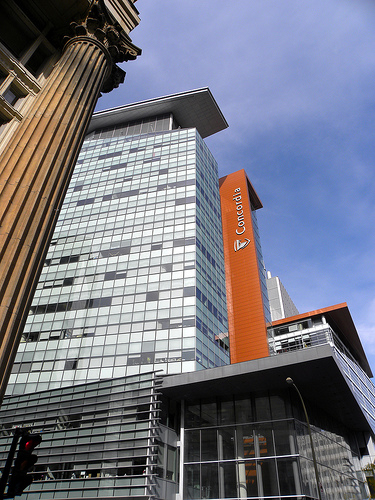Last minute outreach to student body before March 25 vote
“This is a pivotal moment in Concordia history,” is how Concordia Greenhouse coordinator Sheena Swirlz characterized the upcoming referendum that could potentially see a radical change come to how Concordia’s fee levy groups gain their funding.
In an effort to raise awareness, Swirlz was just one of many representatives from some half-dozen fee levy groups that set up tables and spoke to anybody curious enough to inquire as part of an informal information session on Thursday, March 20, at the Hive Cafe on Loyola campus.
On hand besides the Greenhouse were non-profit media organization Cinema Politica, food co-op Le Frigo Vert, student community research and resource group QPIRG, and Concordia’s radio broadcasting station, CJLO.
An upcoming referendum question would ask if individual facul- ties should have the power to decide whether or not to support fee
levy groups, which gain all or part of their budgets directly as a flat fee automatically levied on each student on a per-credit basis. Currently, defunding can only be decided by a university-wide vote of the entire student body, though students have the right to individually opt-out if they so choose.
The modifications, originally brought by John Molson School of Business (JMSB) CSU representatives, are said by supporters to be a more equitable and fair way of distributing the funding as it was unfair to expect some faculties to pay for services they did not use. The original list of fee levy groups, which JMSB wished to separate itself from, included Cinema Politica, CUTV, Le Frigo Vert, Concordia Food Coalition, Art Matters, and QPIRG, but would affect all groups new and old in the future if the referendum is successful.
Swirlz said the loss of financial security would run much deeper than slashed budgets. It would constitute a loss of what she referred to as institutional memory.
Letting go of professional staff, Swirlz said, leads to a loss of ac- quired knowledge and a sense of history gained by a group. Simply hiring a new staff down the line, no matter how motivated they may prove to be, does not make up for the value lost by letting go of long-term members, leaving groups permanently poorer for their loss.
Tave Cole and Alex Lee, two members of Le Frigo Vert, echoed the sentiment by pointing out that Frigo’s mandate of affordable, healthy, and ethical foods would be seriously harmed by the decision.
“I think it’s a misrepresentation,” said Lee of the idea that some of Concordia’s faculties claim their members do not benefit. “No faculty is monolithic,” he said, adding that Le Frigo Vert served thousands of non-students in addition to members of each faculty.
Throughout the afternoon the recurring theme was that far from a hyper-local influence beginning and stopping on campus, the influence of fee levy groups far outstrips school boundaries, and those thinking they might not benefit may underestimate the impact fee levy groups create in the greater community.
CJLO, beyond providing an immediate grounding in broadcasting, gives voice to commentators and musicians and an outlay to culture and the arts; Cinema Politica serves, as volunteer Elsa Donovan noted, as an alternative news source; Swirlz cited Greenhouse horticultural and agricultural workshops and skill building programs, as well as products destined for various Montreal locations in the form of produce or seedlings.
The representatives also pointed out the difficult situations that would be created if faculty defunding goes as planned: students would still have access to the services, but not pay for them. A person could broadcast and listen to CJLO or get in line at the People’s Potato.
“I think it’s something that concerns everyone, and isn’t faculty- specific,” said Ana Paula Castillo, a volunteer at Cinema Politica.
Lindsay Nixon of QPIRG agreed that whatever the result, a major hurdle to overcome was reaching greater student consciousness and creating an awareness of the services fee levy groups offered.
“I was hired as outreach coordinator specifically for this reason so … that we’re more visible on campus,” said Nixon. “Fee levy groups definitely need more visibility.”




